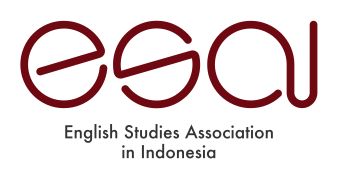RESEARCH TRENDS IN ENGLISH LANGUAGE EDUCATION FROM ONTOLOGICAL PERSPECTIVE: A SYSTEMATIC REVIEW
Abstract
This study aims to produce a systematic literature review on trends in English language education research in Indonesia over the last three years (2019-2021) from an ontological perspective. The Systematic Literature Review (SLR) writing process was conducted in accordance with the PRISMA (Preferred Reporting Items for Systematic Review and Meta-Analysis) framework. The analysis of data resulted in identifying the categories of ontology, namely the categories of teaching, learning, assessing, development of teaching documents like syllabus, learning materials, learning media and instructional model. From these categories of ontology, these studies have been identified and discussed. From the result, it is shown that from the 152 included studies, some areas of English language education tend to have great interest in researching trends of teaching, learning and learning media development. The study also identifies the number of study topics categorized as teaching has increased significantly in the last three years, while the number of research topics categorized as evaluation has decreased. Furthermore, there are two key sources which influence these trends. Firstly, it is due to the COVID-19 pandemic. Second, it is because of the dependency on convenience sampling. Based on the results and interpretations, the authors suggest future research to inform the current situation of research development in English language education.
Keywords
Full Text:
PDFReferences
Baker, E. L. (2012). Ontology-based educational design: Seeing is believing (Resource Paper No. 13). Los Angeles, CA: CRESST.
Brika, S. K. M., Chergui, K., Algamdi, A., Musa, A. A., & Zouaghi, R. (2022). E-Learning Research Trends in Higher Education in Light of COVID-19: A Bibliometric Analysis. Frontiers in Psychology, 12, 762819. https://doi.org/10.3389/fpsyg.2021.762819
Brooks, H., Rushton, K., Walker, S., Lovell, K., & Rogers, A. (2016). Ontological security and connectivity provided by pets: a study in the self-management of the everyday lives of people diagnosed with a long-term mental health condition. BMC psychiatry, 16(1), 1-12. https://doi.org/10.1186/s12888-016-1111-3
Bungsudi, B., & Thresia, F. (2021). Bibliometrics Analysis of English Teaching Method in Covid-19 Pandemic. Sociometry Journal of Social Science, Art and Humanity, 1(1), 11-25. https://doi.org/10.24127/sociometry.v1i1.1343
Garraway, L. Y. (2014). Integrating computer technology in the teaching of Biology. International Journal Of Biology Education, 3(2). https://doi.org/10.20876/ijobed.93986
Hamzah, H., Hamzah, M. I., & Zulkifli, H. (2022). Systematic Literature Review on the Elements of Metacognition-Based Higher Order Thinking Skills (HOTS) Teaching and Learning Modules. Sustainability, 14(2), 813. https://doi.org/10.3390/su14020813
Han, H., & Røkenes, F. M. (2020). Flipped classroom in teacher education: A scoping review. In Frontiers in Education (p. 221). Frontiers. https://doi.org/10.3389/feduc.2020.601593
Jain, G. (2020). Emerging trends of education during & post COVID 19: A new challenge. Solid State Technology, 63(1s), 796-806.
Karami, A. (2019). Implementing audio-visual materials (videos), as an incidental vocabulary learning strategy, in ` 4zsecond/foreign language learners' vocabulary development: A current review of the most recent research. i-manager’s Journal on English Language Teaching, 9(2), 60-70.
Latif, M. M. A. (2018). English language teaching research in Egypt: Trends and challenges. Journal of multilingual and multicultural development, 39(9), 818-829. https://doi.org/10.1080/01434632.2018.1445259
Mutmainah, F. (2019). Research trend in English Language Education Department of Universitas Islam Negeri Sunan Ampel Surabaya (Doctoral dissertation, UIN Sunan Ampel Surabaya). http://digilib.uinsby.ac.id/35636/3/Faizatul%20Mutmainah_D75212074.pdf
O’Toole, J. M., Freestone, M., McKoy, K. S., & Duckworth, B. (2018). Types, topics and trends: A ten-year review of research journals in science education. Education sciences, 8(2), 73. http://dx.doi.org/10.3390/educsci8020073
Pangestu, A. R. (2020). Bagaimana sistem pendidikan Indonesia selama pandemi covid-19? Kompasiana. Retrieved on December 16, 2021, from https://www.kompasiana.com/aderizqipangestu/5ef884f1097f3609c14cfa42/bagaimana-sistem-pendidikan-indonesia-selama-pandemi-covid-19
Quine, W. V. (1980). From a logical point of view: Nine logico-philosophical essays (No. 566). Harvard University Press.
Rashid, S. M., & McGuinness, D. L. (2018). Creating and Using an Education Standards Ontology to Improve Education. In SW4SG@ ISWC.
Searle, J. R., & Willis, Y. S. (1995). The construction of social reality. Simon and Schuster.
Sekaran, U., & Bougie, R. (2006). Metode Penelitian Untuk Bisnis. Jakarta: Salemba Empat.
Şiraz, F. (2021). The literature review on changes in research trends regarding distance education before and during the COVID-19 pandemic (2017-2020). Pegem Egitim ve Ogretim Dergisi, 11(4). https://doi.org/10.47750/pegegog.11.04.09
Tadesse, S. & Muluye, W. (2020). The Impact of COVID-19 Pandemic on Education System in Developing Countries: A Review. Open Journal of Social Sciences, 8, 159-170. doi: 10.4236/jss.2020.810011.
Zein, S., Sukyadi, D., Hamied, F. A., & Lengkanawati, N. S. (2020). English language education in Indonesia: A review of research (2011–2019). Language Teaching, 53(4), 491-523. doi:10.1017/S0261444820000208
DOI: http://dx.doi.org/10.30813/jelc.v12i2.3114
Refbacks
- There are currently no refbacks.



2.jpg)



